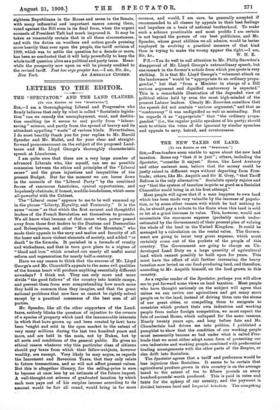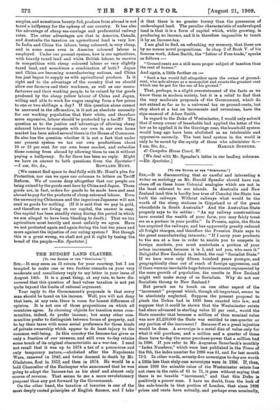THE NEW TAXES ON LAND.
LTO THE EDITOR OF THE "SPECTATOR... j
Sia,—Free-traders seem unable to agree about the new land taxation. Some say "that it is just"; others, including the Spectator, "consider it unjust." Some, like Lord Avebury and other eminent men, believe that the money could be justly raised in different ways without departing from Free- trade ; others, like Mr. Asquith and Sir E. Grey, "that Tariff Reform is the only alternative." Socialists openly rejoice and say "that the system of taxation is quite as good as a Socialist Chancellor could bring in at his first attempt."
Most people will agree that if a man happens to own laud which has been made very valuable by the increase of popula- tion, or by some other reason with which he had nothing to do, he should pay a tribute to the State when this land is sold or let at a great increase in value. This, however, would not necessitate the enormous expense (probably much under- estimated by the Government) of their present plan of valuing the whole of the land in the United Kingdom. It could be managed by a calculation on the rental value. The Govern- ment are going to incur very great expense, which must certainly come out of the pockets of the people of this country. The Government are going to charge an Un- developed Land Duty on a large quantity of agricultural land which cannot possibly be built upon for years. This must have the effect of still further increasing the heavy taxation now levied on our food-producing land, and therefore, according to Mr. Asquith himself, on the food grown in this country.
As a regular reader of the Spectator, perhaps you will allow me to put forward some views on land taxation. Most people who have thought seriously on the subject will agree that unless we can revive our agriculture and get many more people on to the land, instead of driving them into the slums of our great cities, or compelling them to emigrate to countries which protect their own industries and working people from unfair foreign competition, we must expect the fate of ancient Rome, which collapsed for the same reasons. Nearly twenty years ago, and long before fate and Mr. Chamberlain had driven me into politics, I published a pamphlet to show that the condition of our working people must necessarily become so bad under what is called Free- trade that we must either adopt some form of protecting our own industries and working people, combined with preferential trading arrangements with the other parts of the Empire, or else drift into Socialism.
The Spectator agrees that a tariff and preference would be less injurious than Socialism. It seems to be certain that agricultural produce grown in this country is on the average taxed to the extent of ten to fifteen pounds on every hundred-pounds'-worth produced. This is paid in rates and tares for the upkeep of our country, and the payment is divided between local and Imperial taxation. The competing
surplus, and sometimes bounty-fed, produce from abroad is not taxed a halfpenny for the upkeep of our country. It has also the advantage of cheap sea-carriage and preferential railway rates. The other advantages are that in America, Canada, and Australia the taxation on agricultural land is very low. In India and China the labour, being coloured, is very cheap, and in some cases even in America coloured labour is employed. Under our present system, bow is our agriculture, with heavily taxed land and white British labour, to survive in competition with cheap coloured labour or very slightly taxed land, and sometimes a combination of both ? Japan and China are becoming manufacturing nations, and China has just begun to supply us with agricultural produce. Is it right and to the advantage of the country that we should allow our farmers and their workmen, as well as our manu- facturers and their working people, to be ruined by the goods produced by the cheap yellow labour of China and Japan, willing and able to work for wages ranging from a few pence to one or two shillings a day ? If this question alone cannot be answered in the affirmative, is it not an absolute necessity for our working population that their white, and therefore more expensive, labour should be protected by a tariff ? The question as to the justice and 'advantage of allowing cheap coloured labour to compete with our own in our own home market has been asked several times in the House of Commons. So also has the question whether it is not a fact that under our present system we tax our own productions about 10 or 12 per cent. for our own home market, and subsidise those coming from abroad by allowing them to use it without paying a halfpenny. So far there has been no reply. Might we have an answer to both questions from the Spectator ?
[We cannot find space to deal fully with Mr. Hunt's plea for Protection, nor can we open our columns to letters on Tariff Reform. We of course deny altogether that our people are being ruined by the goods sent here by China and Japan. Those goods are, in fact, orders for goods to be made here and sent abroad to pay for the products of cheap coloured labour. Even the unwearying Chinaman and the ingenious Japanese will not send us goods for nothing. (If it is said that we pay in gold, and therefore are living on our capital, the answer is easy. Our capital has been steadily rising during the period in which we are alleged to have been bleeding to death.) That we tax agriculture most heavily and most unfairly we agree. Have we not protested again and again during the last ten years and more against the injustice of our rating system ? But though this is a great wrong, we shall not put it right by taxing the bread of the people.—En. Spectator.]







































 Previous page
Previous page